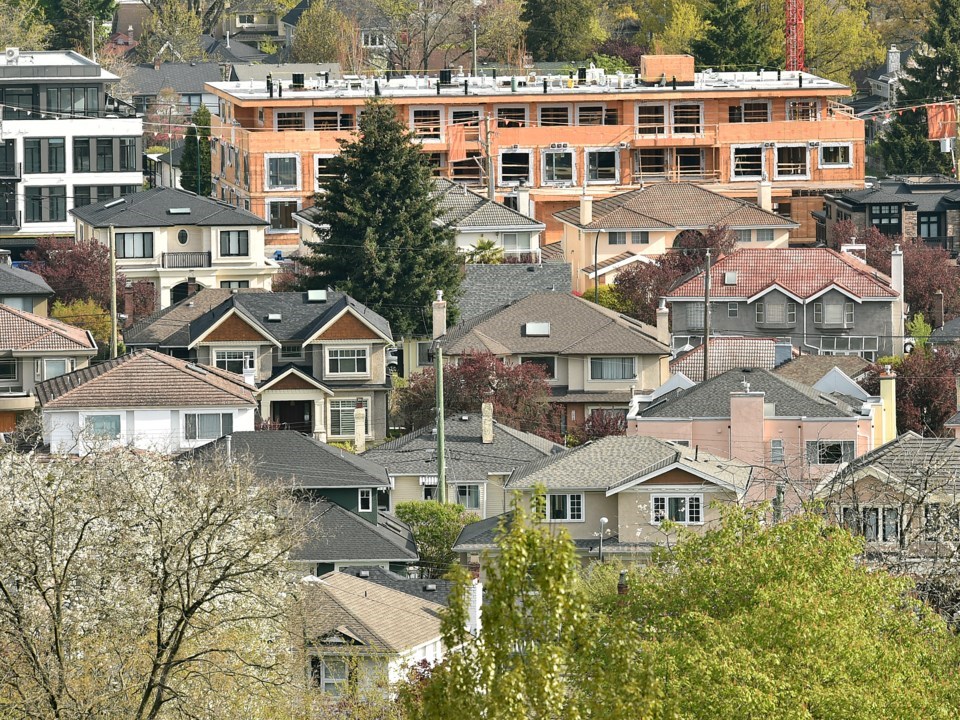Vancouver fell short of the first-year housing target set by the provincial government but a new staff report says the city is on track to increase the number of completed homes in the next few years and surpass the ÎÚŃ»´«Ă˝-mandated five-year target of 28,900.
, which goes before city council Nov. 12, says there were 4,143 net new units completed in Vancouver between Oct. 1, 2023 and Sept. 30, 2024. The provincial target was 5,202.
“We note a decline in completions over the last two years from 2022 to 2024, consistent with the overall trend in the region and with lower levels of housing starts during the COVID pandemic and its immediate aftermath,” the report said.
Despite lower than anticipated completions, the report said “there is an unprecedented volume of projects in-stream,” with enough capacity in the development pipeline to meet the province’s overall completions target over the five-year time frame.
Specifically, there are 58,100 housing units in the pipeline following a record number of rental approvals and building permits issued in the past two years. This includes 19,300 units recently approved and 13,700 units under construction.
In addition, another 3,200 units from development applications related to infills, duplexes and multiplexes are anticipated to come in and be completed over the housing target reporting period.
“An additional 21,900 units will complete after the next four years from applications currently under review,” the report said. “Of the total units at different stages of development, 33,700 units are expected to complete within the [housing target] period, exceeding the provincial target of 28,900.”
Nearly two-thirds, or 63 per cent, of new units completed over the first-year target period are purpose-built or secondary rental, for a total of 2,618. The remaining 1,525, or 37 per cent, were built for ownership.
The provincial government wants 39 per cent of all units to have two or more bedrooms, including 22 per cent being three bedrooms. So far, Vancouver has seen 1,523 apartments built with two or more bedrooms, including 458, or 15 per cent, with three bedrooms.
“Based on an analysis of projects in the development pipeline, it will be very difficult to achieve the province’s guidance for three-bedroom units, especially in light of current market conditions,” the report said.
'Deepen affordability'
Another challenge for the city will be to achieve the province’s target of 38 per cent of rental units renting at or below the Housing Income Limits (HILs) rate, including three per cent with on-site supports.
HILs represent the maximum gross household income for eligibility in many affordable housing programs. The HILs are based on figures established by ÎÚŃ»´«Ă˝ Mortgage and Housing Corporation, and intended to reflect the minimum income required to afford appropriate accommodation in the private market.
Over the past year, only 313 units were completed at this affordability level.
“As staff have consistently stated, achieving this share of rental units at or below HILs is not possible without significant additional investment from senior government partners to help fund and finance non-profit projects and deepen affordability,” the report said.
While the city has the ability to approve projects and expedite processes, the timing for construction and completion of housing units is dependent on factors that are largely beyond its control, the report said.
That includes capacity of the construction sector, inflationary pressure, access to funds and financing for market and non-market developers.
“Making meaningful progress towards project completion requires coordinated effort by all levels of government and various sectors of the economy,” said the report, noting Vancouver leads the region in construction activity, which has been supported by city policies and incentives boosting rental starts.
Housing Supply Act
The Housing Supply Act came into effect in the spring of 2023, enabling the provincial government to set housing targets for ÎÚŃ»´«Ă˝ municipalities. Vancouver was among the first 10 municipalities selected.
Under the act, municipalities are required to submit regular reports on the progress towards housing targets. For Vancouver, a report for the period between Oct. 1 to Sept. 30 is required annually from 2024 to 2028.
The provincial government may take certain actions if a municipality has not met its housing target or made satisfactory progress to meeting the target, including the appointment of an advisor to make recommendations on additional actions to meet or revise targets.
The housing minister may also issue a directive to municipalities to enact bylaws and issue specific permits, or both. Ravi Kahlon was ÎÚŃ»´«Ă˝’s housing minister prior to the Oct. 19 election and served in that role when housing targets were established.
Premier David Eby will swear in a new cabinet Nov. 18.



